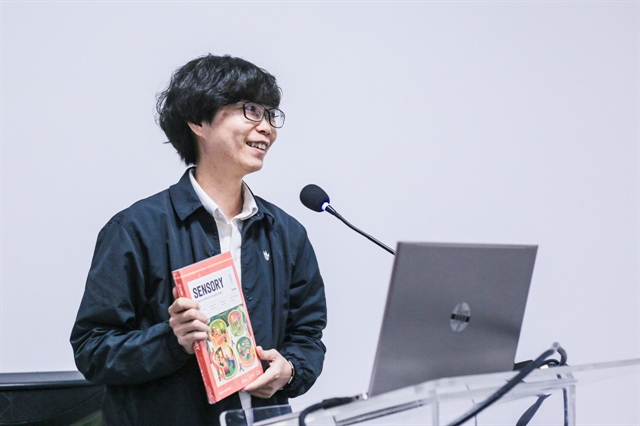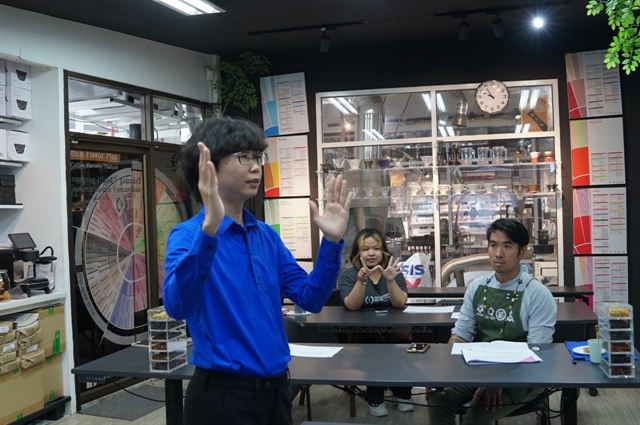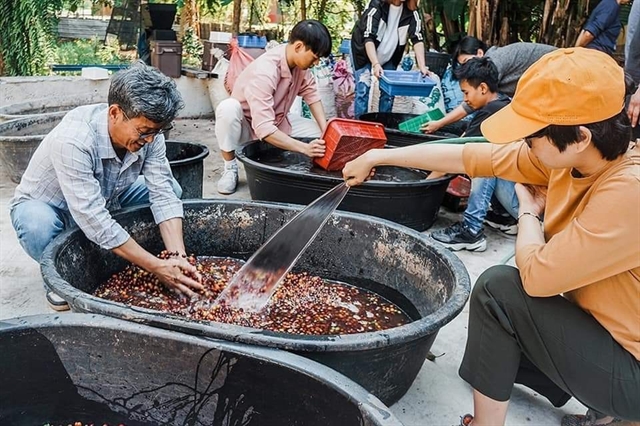Weather:
- Ha Noi 22oC
- Da Nang 22oC
- Ho Chi Minh 29oC

Julie Đặng, who has a strong passion for Vietnamese coffee, has dedicated her life to the industry. She has travelled to various countries, immersing herself in different coffee cultures, and holds important positions in coffee organisations.
Việt Nam News speaks with Đặng to understand her thoughts on the development of the coffee culture in Việt Nam.
Inner Sanctum: You have worked in the coffee industry for a long time. Can you tell us what inspired you to join the industry and how you developed that passion?
The first cup of espresso in life entirely changed my perception and point of view about coffee. I used to not like coffee and had never thought much about its relevance in my life.
Being from HCM City, I was no stranger to the black, bitter beverage that many people adore. Back then, I didn't have any impression about coffee. Destiny, however, always has its way of surprising us when we least expect it.
My story began in my first year of university when I was invited by a friend to try a cup of coffee.
Although I was not particularly interested at the time, my eyes immediately went to the coffee machine.
I chose to drink an espresso because of the impression the name carried.
From the moment the coffee streamed into the cup, I entered a world of incredible flavours and memories intertwined with coffee.
The first espresso completely overturned my preconceived notions about coffee - the black, bitter, strong brew that is traditional Vietnamese coffee.
It was completely different! It carried the aroma of delicate creamy water, with the waves of coffee blending into the layer of foamy golden cream, touching the lips with a rich and creamy texture, tasting powerful when consumed and leaving a sweet aftertaste.
It is fascinating how our lips have over a million nerve endings, and they intensified that never-before experience.
That cup of coffee made me think of people in love and being loved. It was proof that timing and the right person matter. That is why the memory of what happened that day has stayed with me until today.
Inner Sanctum: What are the strengths and weaknesses of the Vietnamese coffee industry?
The coffee industry in Việt Nam is experiencing a rejuvenation with a younger demographic involved on both the production and consumer sides.

The availability of young talent and fresh ideas will contribute to the sustainable and systematic development of the country’s coffee industry.
Additionally, the country's geographical climate makes it a major supplier for the global coffee market.
Over the past 10 years there have been noticeable changes in various aspects of the Vietnamese coffee industry.
The most memorable and significant change is the growth in clean coffee production, which has led to dramatic shifts in both production and consumption habits throughout the market.
Clean and whole bean coffee has become the standard in every production and business activity.
Awareness of the health impacts of consuming low-quality coffee has been the driving force behind this transformation.
Another notable change is the entrepreneurial wave, with coffee being the most sought-after target for many.
Modern coffee shops with state-of-the-art machinery have sprung up everywhere, and business owners are investing extensively in learning about coffee to create exceptional coffee experiences.
Once developed on a broad scale, the next phase will focus on enhancing the quality.
Everyone involved in production and providing service will strive for higher overall quality, specifically in the context of coffee.
In the past three years the Vietnamese coffee market has steadily achieved positive results by emphasising sensory taste experiences.
Whether it is purchasing machinery, selecting coffee beans or attending training courses, people are concerned about whether these works will improve the aroma and taste of the coffee.
Inner Sanctum: Can you summarise the development of the Vietnamese coffee industry to give readers an overview of the industry?
The development of the Vietnamese coffee industry can be closely tied with the three production periods.

First was the era of clean coffee production.
In this period coffee was harvested extensively, with a high proportion of green beans. Minimal attention was paid to the post-harvest process, and the main products on the market were whole bean coffee. The quality of the coffee was not a major focus.
In the second era coffee was harvested with a focus on achieving consistent ripeness, and significant attention was paid to post-harvest processes. The products entering the market exhibited consistent quality.
Third was the era of emphasising unique flavours. There are many reasons to believe that the Vietnamese coffee market will develop towards a flavour-oriented direction in the coming years. Efforts will be focused on improving the taste experience for customers and providing them with exciting coffee experiences.
Overall, the future of the Vietnamese coffee industry looks promising as it focuses on improving quality and enhancing the sensory experience for consumers.
Inner Sanctum: What are the competitive advantages of Vietnamese coffee? How can it become a stronger competitor in the global market?
The strengths of Vietnamese coffee include its reasonable pricing and the cultural association of coffee with social activities, and the number of coffee lovers is increasing.
To compete in the international market, it is necessary to invest in the core element of coffee.
The quality of the coffee should be closely tied to the sensory taste experience that a particular type of coffee provides.
When coffee is highly regarded in terms of sensory experience, it is also valued more in terms of its worth. This is an important factor in competing internationally.
Inner Sanctum: What do you think about the human resources in the coffee industry? What must we do to have high-quality human resources?
Human resources always play a crucial role in the development of any industry.
In reality, high-quality human resources create a significant advantage in sustainable economic and social development. Investing in education and nurturing human resources will help Việt Nam enhance its position in the global economic, political and social arenas.

After working for many years in the international environment, I think the talent in coffee brewing and evaluation in Việt Nam is not inferior to foreign competitors.
But we still lack the necessary infrastructure, in which human resources play an extremely important role.
Inner Sanctum: What must young people do to pursue their dream of being successful in the coffee industry?
Dream big, start small. The journey of a thousand miles begins with a single step.
Equipping oneself with sensory skills is essential for success. Sensory skills are the introductory lesson in the coffee business.
When we mention coffee, most of us immediately think of the techniques of a barista and modern equipment, but forget that sensory skills are the most important aspect.
Without being able to differentiate between flavours and perceive coffee, we cannot know if a coffee is of sufficient quality or if a cup of coffee meets the requirements of a customer.
Everyone needs to have sensory skills, and everyone can develop these skills. For those already working in the coffee industry, we believe that you can challenge yourself and focus on ways to enhance your sensory skills. VNS


